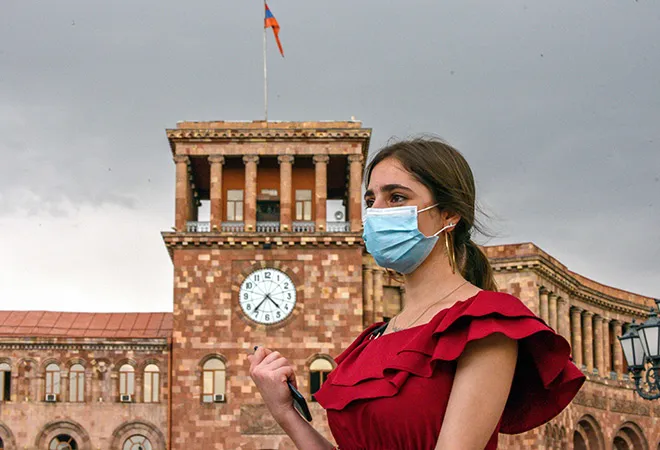
This article is part of the series — The Future of the Pandemic in 2021 and Beyond.
2020 is the year that will certainly be remembered for the outbreak of COVID-19. Since the years of the Great Depression in the previous century, the SARS-CoV-2 pandemic has become a major health issue and economic burden for most of the Western hemisphere. However, its detrimental impact has been particularly tangible for smaller countries with limited economic and social capacity to fight the outbreak of the virus. According to open sources, judging by the number of total cases per million population, Armenia has suffered the most compared to other South Caucasian states and has notoriously climbed up to the top 10 worldwide by the aforementioned index.
Starting from March 2020, the national government of the Republic has introduced a number of unpopular but necessary measures, including harsh travel restrictions aimed at stopping proliferation of the virus. At the same time, sensible amounts of funds have been allocated to provide social and economic aid to the local population and national manufacturers. By the end of the summer, it seemed like the peak of the virus had passed with the country slowly but firmly moving to a post-pandemic period of gradual recovery.
The escalation of the Azerbaijani-Armenian war coincided with the second wave of COVID-19 — explained internationally as an acceleration of the spread of the virus in the cold season.
However, the Azerbaijani-Armenian war, unleashed on 27 September, has had significant impact on the number of COVID cases in Armenia. The positive tendency achieved by the second half of September was nulled due to a major shift in the priorities of the country and attention of the people, for whom the coronavirus destruction became secondary in light of the active hostilities and escalation in Nagorno Karabakh. Facing a large-scale war causing massive destruction and civilian casualties in the region and prioritising above all else the matter of self-defence against military aggression, the Armenian people seemed to temporarily forget about the threat that the coronavirus poses. Unfortunately, the escalation of the war coincided with the second wave of COVID-19 — explained internationally as an acceleration of the spread of the virus in the cold season. An understandable shift in everyone’s attention to the urgencies of war made the country very weak in terms of allocating additional time and resources against a foe that seemed to have been defeated in the summer.
As the relevant data revealed, the number of infected cases in Armenia grew drastically precisely during the period of war. More than 2,000 daily cases (a truly record number for a country with a population of less than three million) were registered between 22 October and 9 November. Compared to the previous months, when the numbers were relatively low and declining during the summer — which allowed the national government to talk about certain improvements in the fight against COVID — a sharp increase of positive tests during the entire war period made national authorities revise their projections.
If the specifics of the virus remain highly volatile, it is too early to hope for substantial betterment.
Combating the pandemic and its tremendous repercussions urged Armenia to seek external support as well. India, Russia, and France, to name but a few, were prompt to help Armenia in the most complicated periods of the last months, providing medical, vocational, economic and other aid to ease the burden of the pandemic’s effect on the country in general. In particular, the Minister of Health, Arsen Torosyan, asked the Ambassador of India to Armenia, Kishan Dan Dewal, to consider the possibility of providing humanitarian assistance. According to the press service of the ministry, Torosyan told the ambassador that the Armenian health system was ready for the second wave of the coronavirus; however, as a result of the war, it became necessary to replenish Armenian medical centres with new equipment and medicines. The ambassador, in turn, assured that he would consider all possible options for assistance after consulting the Ministry of Foreign Affairs of India.
Having said all of this, what could one expect from 2021? Clearly, it is not wise to anticipate an immediate improvement of the situation. If the specifics of the virus remain highly volatile, it is too early to hope for substantial betterment. For Armenia, just like most countries that went through a second wave, it is essential at least to stabilise the situation as soon as possible in order to prevent a new potential wave, higher than the current one, which is already overloading the national healthcare system.
Armenia can potentially benefit from the vaccines developed by Russia, called Sputnik V, and its subsequent versions, as well as any other vaccine with a stably high rate of efficiency.
The development and appearance of several vaccines on the market, not fully efficient yet, promises that the current forms of SARS-CoV-2 can be healed with relative success. In this respect, Armenia can potentially benefit from the vaccines developed by Russia, called Sputnik V, and its subsequent versions, as well as any other vaccine with a stably high rate of efficiency. There should be no geopolitical ambiguity when it comes to saving thousands of peoples’ lives. The last reports suggest that the US-developed Moderna has 100% efficacy against severe COVID-19 cases. The traditionally decent relationship between the United States and Armenia, as well as the very fact that the most efficient vaccine so far has been developed by a pharmaceutical company whose CEO is of Armenian descendant, may positively affect the likelihood of Armenia receiving the Moderna vaccine at a lower market price.
Following the examples of several countries and taking into account the currently poor domestic economy, possible mandatory vaccination should be realised either at very low cost or for free. This being said, Armenia can negotiate and secure further international support to stabilise the local epidemic situation. However, it would be naïve to predict the precise scenario of how a country that is very dependent on external support will feel in case of global uncertainty. Geopolitical squabbles must be put aside when a threat of this scale appears. Smaller countries, like Armenia, may yet have their loud voice heard in bringing different countries together to address the issue in an all-inclusive manner.
The views expressed above belong to the author(s). ORF research and analyses now available on Telegram! Click here to access our curated content — blogs, longforms and interviews.




 PREV
PREV


